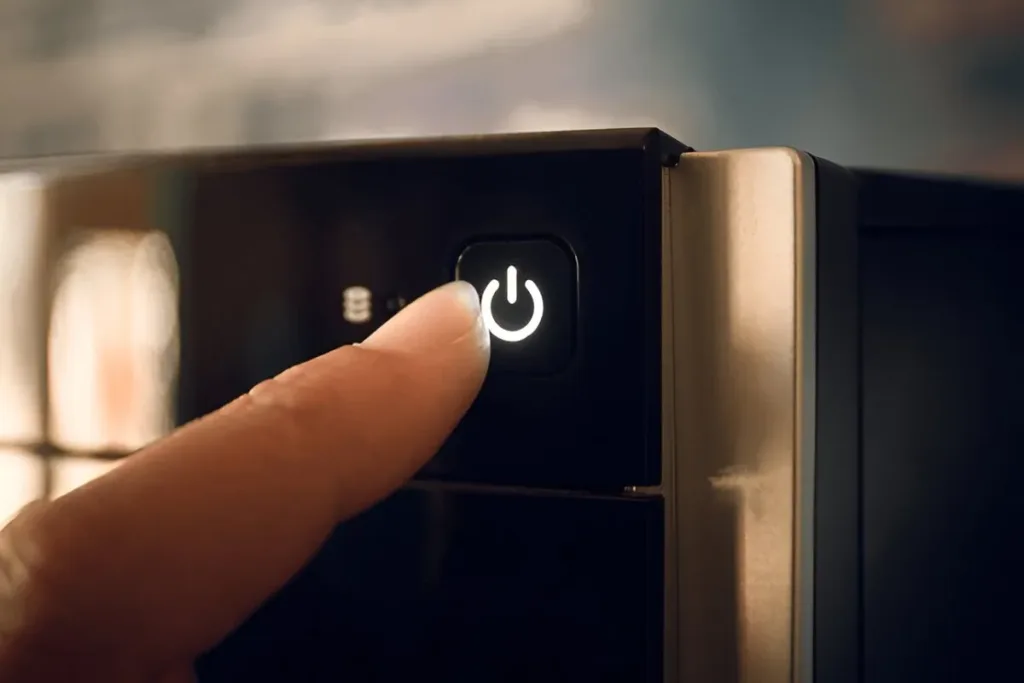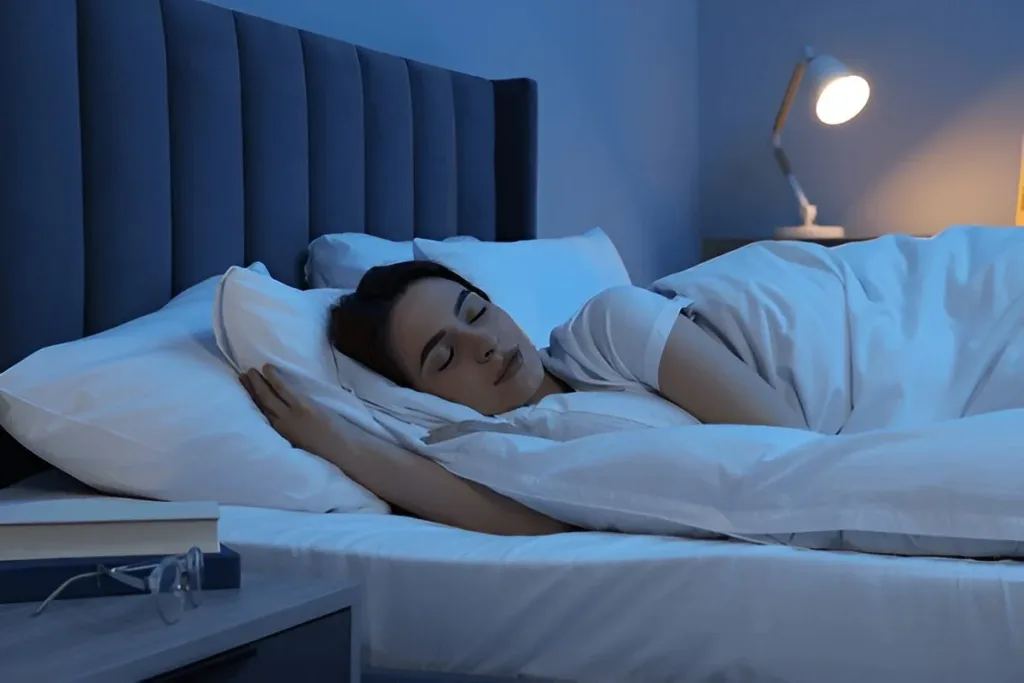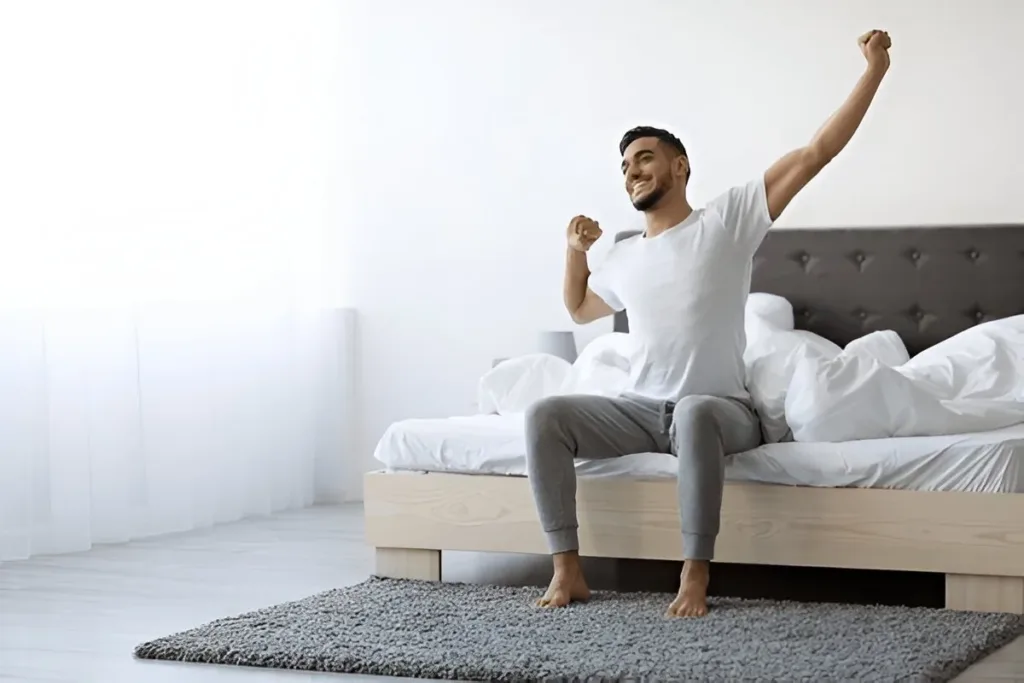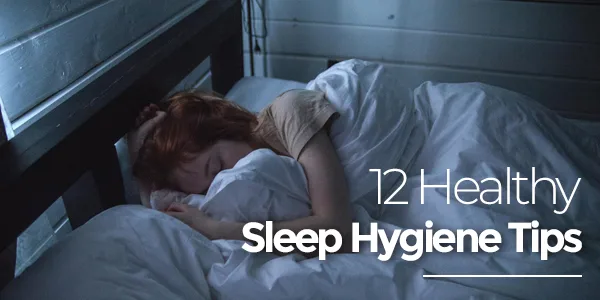Let’s be real: falling asleep isn’t always the easiest thing to do. Many of us struggle to get the sleep we need because our brains are racing, we are scrolling through social media late at night, or we just don’t have a routine.
So what’s the solution? Sleep Hygiene.
You may have heard about this before, but it is more than just a buzzword. Sleep hygiene is the habits and conditions that help you get good sleep each and every night. And you don’t need pills, expensive gadgets, or severe routines to improve your sleep hygiene.
We will cover 12 useful tips below that will help you fall asleep more quickly, stay asleep longer, and wake up actually rested.
What Is Sleep Hygiene?
Sleep hygiene comprises everyday habits and surroundings that promote sound, restorative rest. From your morning routine to your nighttime wind-down, the choices you make heavily influence sleep quality. Bad sleep hygiene can cause:
- Difficulty falling asleep.
- Frequent awakenings during the night.
- Persistent tiredness even after enough sleep.
- Long-term effects on mood, concentration, and overall health.
The bright side? You can upgrade these habits naturally-no medication needed. Below are some of the most effective strategies to do just that.
Healthy Sleep Hygiene Tips
1. Wake Up and Sleep at the Same Time Every Day

Your body loves routine. When you go to bed and get up at the same hour every day, you are respecting your circadian rhythm, your internal clock that indicates when it’s time to feel sleepy or awake.
Routine is important to helping you fall asleep faster, feel more refreshed when you wake up, and improve sleep quality overall.
Take care not to drift too far from that routine on weekends. Oversleeping can lead to disruption of your rhythm, with difficulty falling asleep on Sunday and waking up on Monday. Try to maintain your regular wake‑up time within about an hour on your day(s) off.
2. Create a Calm, Pre-Sleep Routine

Your body can’t be forced to sleep instantly-it needs a bit of time to unwind. A calming nighttime routine signals that it’s time to rest, making it easier to drift off naturally.
Begin to relax 30-60 minutes before you hit the pillow with simple, soothing habits such as:
- Lowering the lights.
- Gentle stretching or breathing drills.
- Sipping herbal tea (like chamomile or lemon tea)
- Playing soft music or doing a brief meditation.
Repeating the same steps each night trains your brain to associate those actions with sleep, resulting in a smoother bedtime over time.
3. Power Down Electronics

That late-night scrolling may look harmless, but devices-phones, tablets, TVs-produce blue light that suppresses melatonin, the hormone that tells your body it’s time to rest.
And it isn’t just the light; the mental buzz from alerts, endless scrolling, or binge-watching keeps your mind active when it should be winding down.
To let your system unwind, power down screens at least an hour before bedtime. Instead, try:
- Reading a paperbook.
- Writing your thoughts in a journal.
- Doing something soothing like sketching or coloring.
4. Get Daily Movement

Physical activity during the day can improve your mood, but it also improves your sleep quality in the evening. Regular exercise supports your natural energy cycle, which keeps you awake and alert during the day and sleepy in the evening when it’s time to sleep.
Strive for at least 30 minutes of moderate activity most days-a brisk walk, a bike ride, or even dancing around the living room will do. Whenever you can, do it outdoors, as exposure to natural light helps keep your circadian rhythm on schedule.
Just watch the timing: steer clear of vigorous workouts right before bed, since they can leave you too pumped to relax. Opt for light stretching or yoga if you prefer moving later in the evening.
5. Avoid Caffeine in the Afternoon

Caffeine can provide that extra boost to get through the afternoon, but it can also linger in your system longer than you might think, around six to eight hours on average. So, even if you don’t experience racing thoughts or jitters, that coffee or soda at that 4 o’clock hour might be affecting your sleep quality, nonetheless.
As a good rule of thumb, stop drinking caffeine after the 2 o’clock hour. If you are particularly sensitive to caffeine, you may want to end your caffeine consumption even earlier than two o’clock.
The following are just a few products where caffeine may be present that might surprise you:
- Chocolate (especially dark)
- Energy drinks and certain pre-workout powders.
- Tea (black or green)
- Over-the-counter medications (such as headache medications)
So if you are struggling to fall asleep, or struggle to wake up feeling rested, take a look at your afternoon routine, you may be sacrificing your sleep for that little afternoon pick-me-up around 3 o’clock.
6. Make Your Bedroom a Sleep Sanctuary

First, keep your bedroom cool. Most people sleep best when the temperature sits between 60-67 °F (15-19 °C). A cooler environment helps your body naturally lower its core temperature, which is an essential part of drifting off.
Comfort is equally important. Make sure that your mattress is in good condition and comfortable to sleep on, pillow, and bedding truly support restful sleep. If the bed isn’t comfortable, your body will struggle to relax, even if you’re tired.
If you are sensitive to noise, try earplugs or a white-noise machine to drown out background sounds. They’re especially useful if you live in a noisy area or share a bed with a snoring partner.
And don’t overlook light. Consider having blackout curtains so that your sleep will not be disturbed by the street lights or early morning sun.
7. Keep Your Bed a Peaceful Place Just for Sleep

When you frequently work, eat, or watch television in bed, your mind starts to see the bed as a place for activity, rather than a place to rest. This makes it more challenging to go to sleep because your mind and body aren’t getting the proper cue to settle down.
Reserve your bed solely for sleeping and intimate moments. By practicing this behavior, the brain will start to associate the bed with calmness, and when you lie down, it will immediately be triggered that it is time to relax and sleep.
If you do not feel tired, do not force it. Find a quiet space to sit and do something relaxing until we feel drowsy.
8. Go to Bed When You Are Truly Sleepy
If you try to make yourself fall asleep when you’re not feeling sleepy, it usually fails. As a result, you toss and turn and feel angry, which keeps your body awake instead of relaxed.
If you’ve been awake in bed for 20 to 30 minutes and don’t feel sleepy, get up and do something relaxing, like reading or gentle stretching. Don’t look at screens. Only go back to bed when you start to feel sleepy. This helps your brain connect the bed with sleep, which makes it easier to fall asleep over time.
9. Limit Daytime Naps
Napping can be an effective way to recharge your batteries, but if you sleep too long or too late in the day, you may have difficulty falling asleep at night.
Here are some basic rules for better napping:
- Take brief naps, 15-30 minutes.
- Try to nap before 3 p.m. so that it does not affect your nighttime sleep.
If you struggle with sleep at night, it’s probably best to avoid naps.
A nap can provide a little energy boost, but having too much extra daytime sleep can disrupt your whole sleep routine.
10. Ease Bedtime Anxieties

You may find yourself restless at night, thinking about your to-do list, thinking about a recent conversation, or thinking about something you might have to do soon. It is anxiety, thinking, and “brain noise” that usually make it difficult to sleep and decrease the quality of your sleep.
If you are struggling to relax and quiet your mind before going to sleep, here are some practical things you can do to quiet your mind:
- Write down your thoughts or to-do lists for tomorrow in a notebook.
- Take some time from your daily routine and pay gratitude or think about the beautiful memories that will make you happier.
- Do some breathing exercises to relax your mind and overall body before going to bed. Slowly inhale for 4 sec, count to 4 sec, then slowly exhale for 6 sec.
11. Avoid Late-Night Meals and Alcohol

Eating a big or heavy meal immediately before bed can cause discomfort, such as heartburn or indigestion, which makes it harder to sleep well. Try to finish eating at least two to three hours before bed.
Similarly, even if alcohol makes you feel sleepy initially, it tends to wake you up later on, especially during REM (rapid eye movement) sleep, which allows your brain to reset and recuperate.
12. Harness Light Effectively

Morning daylight signals your internal clock, helping you stay alert all day long. Try to spend a few minutes outside or near a sunny window each morning.
In the evening, lower the lights and switch to warmer hues to tell your body it’s time to unwind.
Cut down the screen time during nighttime, or enable “night mode” on your gadgets to reduce blue light that keeps your mind awake.
If you work late or night shifts, blackout curtains and light‑blocking glasses can keep your sleeping space dark when you need rest.
Bottom line: use bright daylight to wake up and soft, dim lighting to wind down – a simple habit that truly helps.
When Is the Best Time to Exercise for Better Sleep?
The ideal window for workouts that improve sleep quality is typically in the morning or early afternoon. By working out in daylight, you keep your system aligned to daytime and generate reports after dark that will help you sink into better restorative sleep.
If the night is when you can exercise, stay far away from doing any high-paced activities in the hour before you sleep to avoid overstimulating your body.
Go for some relaxing movement like easy stretching, restorative yoga, or walking if you want to cultivate sleep and rest.
In summary, you have better sleep producing results when you have activity earlier in the day than later at night, and night similar and not stimulating short-duration light activity.
Can a Poor Mattress Cause Sleep Problems?
Definitely – a bad mattress can affect your sleep. If your mattress is too soft or too firm, worn out, or just plain awful, it can lead to back pain, tightness, and restless sleep. Over time, this can lead to chronic fatigue, irritability, and poor focus during the day.
An older or poor-quality mattress can also host dust mites and have allergens that can cause you to feel congested, sneeze, or all of the above at night
Final Thoughts
Improving your sleep isn’t about seeking perfection. It is about establishing intentional habits and behavioral patterns that better support your body’s natural cycle.
Start with one or two of these sleep hygiene principles and then build on them as you go. The more consistent and frequent you are with your behavioral changes, the better your sleep will get – and the more energy, focus, and resilience you will have during the day.
And remember: if your sleep has been disrupted or non-existent for weeks or months, it is okay to ask for help. A sleep specialist or doctor can assist in ruling out root causes such as sleep apnea, chronic insomnia, or restless legs syndrome.
FAQ’S
1. Does exercising before bed help or hurt my sleep?
Working out right before bed can allow you to sleep or disrupt it, depending on how physically demanding you worked out. Typically, light physical activity such as yoga or stretching will have a mildly relaxing effect and a better sleep experience. Other forms of vigorous exercise, if done immediately before bed, may disrupt your ability to fall asleep. In general, most recommend that you do the workout/exercise at least 1-2 hours before bed.
2. What are the main points of sleep hygiene to improve mental health?
Sleeping well is more than just waking up restored; it impacts your mental well-being as well. A calming pre-bed routine, going screen-free prior to sleep, and keeping your sleep environment cool, dark, and comfortable, allow your mind to relax naturally. Over time, these habits can help you manage stress, be happier, and have better thoughts during the day. Simple sleep habits are an easy way to care for your mental well-being.
3. What are the healthy sleep habits for adults?
Healthy sleep habits for adults are just being consistent about a regular sleep schedule. Calm down your mind with relaxing activities, and dim your room lights to make it dark, comfortable, and quiet. Avoid taking caffeine late in the evening, limit taking heavy meals or alcohol before going to sleep.
4. What is the importance of sleep hygiene?
Sleep hygiene is very important as it keeps your mind and body both relaxed and calm. Healthy habits before going to sleep make your sleep more restful by helping you fall asleep and wake up feeling refreshed. Without proper hygiene, you may struggle with tiredness, focus, mood, and overall health.
5. What is the proper sleep hygiene for kids?
For children, sleep hygiene refers to a no-frills, enjoyable pre-bedtime routine and excellent sleep setting that helps them feel relaxed. Sleep hygiene can mean anything from having the same bedtime each night, having some quiet time doing something calming like reading to them, not having screen time before bed, and ensuring the bedroom is dark and cool. A good night’s sleep begins with simple, consistent habits while avoiding things like sugary snacks or caffeine in the evening.

